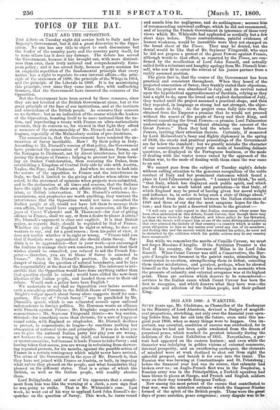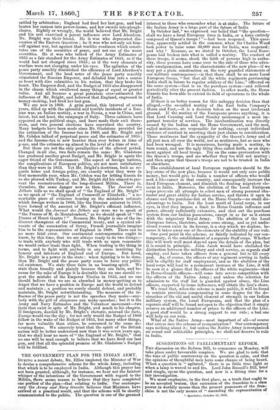1853 AND 1860: A WARNING.
SEVEN years ago, Mr. Gladstone, as Chancellor of the Exchequer in the Ministry Of Lord Aberdeen, devised a Budget of magnifi- cent proportions, stretching, not only over the financial year open- ing before him, but far out into the future, even unto this ma- gical year 1860, when so many things were to happen. One im- portant, nay essential, condition of success was overlooked, for in those days we had not been quite awakened from the dream of perpetual peace, which reached its greatest intensity during the delirium of the Great Exhibition of 1851. Nevertheless, a por- tent had appeared on the eastern horizon ; and even while the financier was indulging in golden visions of external commerce, internal prosperity, and an overflowing exchequer, the elements of mischief were at work destined to shut out from sight the splendid prospect, and banish it for ever into the inane. The Russian war was brewing at Constantinople and St. Petersburg ; before the financial year had run its course, that calamity had broken over us ; an Anglo-French fleet was in the Bosphorus, a Russian army was in the Principalities, a Turkish squadron had been blown to pieces at Sinope, and French and English soldiers were on their way towards European Turkey.
Now among the most potent of the causes that contributed to that war, was the mistaken estimate which the Emperor Nicolas formed of the spirit of the British people. Those were the great days of peace societies, peace congresses ; every dispute was to be
settled by arbitration; England had fired her last gun, and had beaten her cannon into power-looms, and her swords into plough- shares. Rightly or wrongly, the world believed that Mr. Bright and his sect exercised a potent influence over Lord Aberdeen. Mr. Bright was their friend. He it was who deprecated dis- cussion of the Eastern Question ; • he it was who not only set him- self against war, but against that warlike readipess which consti- tutes one of die securities of peace, and not one of the worst securities. He it was who talked of the Army Estimates of 1835 as a fair standard for the Army Estimates of 1853, as if the world had not changed since 1835 ; as if the very elements of warfare were not changing under his eyes. The agitation of the peace party sensibly diminished the efficiency of Lord Aberdeen's Government, and the loud notes of the peace party sensibly stimulated the Russian Emperor, and deluded him into a course so beset with dire calamities to his nation, that they broke his heart. The Emperor died, and the Budget of 1853also disappeared in the chasm which swallowed many things of equal or greater value. And all because a great potentate over-estimated, the influence of Mr. Bright, and believed that England, engrossed in money-making, had fired her last gun.
We are now in 1860. A grim period, this interval of seven years, filled up with the splendid and terrible incidents of a Rus- sian war; an Indian mutiny, a war in Persia, a war in China, and latest, but not least, the campaign of Italy. Three cabinets have appeared on the political stage, and have made their exit there- from, and two general elections have convulsed the country. Many budgets have been made since Mr. Gladstone provided for the extinction of the Income-tax in 1860, and Mr. Bright and Mr. Cobden talked of perpetual peace and the estimates of 1835 ; and the Income-tax is now heavier than ever before in time of place, and the estimates up almost to the level of a time of war.
But these are not the only peculiarities of the altered period. Changed in all else, two facts remain the same : Mr. Gladstone has produced another great Budget, and Mr. Bright is again' the eager friend of the Government. The aspect of foreign nations, the complications of European politics, are not more satisfactory than they were in 1853. Yet Mr. Bright's doctrines, both as re- gards home and foreign policy, are exactly what they were in that memorable year, when Mr. Cobden was for letting Russia do as she pleased with Turkey, and Mr. Bright did his utmost to pre- vent the reconstruction of the long-disused Militia. There is, therefore, the same danger now as then. The Journal des Debats tells us we shall speak of " the England of Mr. Bright " as we speak of " the England of Cromwell or Elizabeth ; " a re- markable piece of evidence bearing on the mistaken estimate which foreign writers in 1860,- like the Russian autocrat in 1853, have formed of the amount of Mr. Bright's efficient influence. What would the Journal des Debuts say were we to speak of "the France of M. de Montalembert," as we should speak of "the France of Henri Quatre ? " Because Mr. Bright is one of the in-: discreet champions of the Commercial treaty, and a cynical ad- vocate of the annexation of Savoy, French journalists imagine him to be the representative of England in 1880. There can be no more fatal error. Our continental contemporaries ought to know, by this time, that we are always ready to do two things— to trade with anybody who will trade with us upon reasonable we would rather trade than fight. When trading is the thing in terms, and to fight with anybody in any cause involving the honour and interests of England and of Europe. But hand, Mr. Bright is a power in the state ; when fighting is to be done, then Mr. Bright and the peace party cease to have any politi- cal existence. We state these facts in no boasting spirit. We state them broadly and plainly because they are facts, and be- cause for the sake of Europe it is desirable that no one should re- peat the mistake of the Emperor Nicolas in 1853, and no one should believe that we are so absorbed in money-getting as to forget that we have a position in Europe and the world to defend and maintain ; a position we surely should defend, and probably maintain, Mr. Bright notwithstanding. The measure of the in- fluence of the peace party is not the speeches they make—any- body with the gift of eloquence can make speeches ; but it is the Army and Navy Estimates and the Volunteer movement—two facts that exist in spite of Mr. Bright, and much to his chagrin. If foreigners, dazzled by Mr. Bright's rhetoric, misread the facts, Europe would rue the day ; for not only would the Budget of 1860 follow in the wake of the Budget of 1853, but many other things, far more valuable than either, be consumed in the same de- vouring flame. We sincerely trust that the spirit of the British nation will be better understood now than it was seven years ago, that we shall hear no more of " the England of Mr. Bright," that no one will be mad enough to believe that we have fired our last gun, and that all the splendid promise of Mr. Gladstone's Budget will be fulfilled.



























 Previous page
Previous page